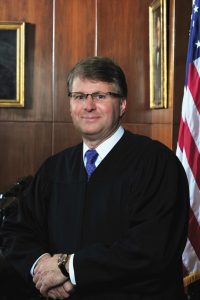Courtroom To Campus
The idea of building a career in the field of law didn’t come overnight to Mark Martin ’85. He received some hints along the way from individuals who were important in his life. Several years before he enrolled as a student at Western Carolina University, Martin announced to his father, Dean Martin, that he intended to join the U.S. Army Special Forces. The elder Martin at that time was wrapping up a career as a U.S. Air Force officer that spanned more than two decades and included the rank of colonel. Upon hearing his son’s big news, Mark Martin says his father paused for a moment and then said, “Mark, you need to be a lawyer.”
By 1981, Dean Martin had retired from the military and was beginning his academic career as a member of the business faculty at WCU. Mark Martin says he enrolled at the university with the start of the 1981 fall semester primarily because his father was on the faculty and his parents lived in Cullowhee. He credits the university’s impressive student-to-faculty ratio and emphasis on superior teaching as keys to his ability to excel as a student on campus. And, on the way to graduating with highest honors with a bachelor’s degree in business administration, one of his favorite professors, Patsy Scott, gave him another nudge toward the field of law, suggesting that he consider becoming an attorney.
Martin went on to earn his juris doctorate with honors at the University of North Carolina School of Law in 1988. After serving as a law clerk for U.S. District Court Judge Clyde H. Hamilton for two years, Martin entered private practice at the McNair Law Firm of Raleigh, focusing on civil litigation and business law. In 1991, he took on the role of legal counsel to N.C. Gov. Jim Martin (no familial relation), and the following year, Mark Martin, then 29 years old, was appointed by the governor as a resident Superior Court judge. In 1994, at 31, he became the youngest judge ever to serve on the N.C. Court of Appeals, and 1998 brought another “first” as he was appointed, at 35, as the youngest justice in the history of the North Carolina Supreme Court. Sixteen years later, in 2014, Martin was appointed chief justice of the court by then-Gov. Pat McCrory.
When it comes to the judicial philosophy that has guided his decisions from the bench, Martin describes himself as a “textualist.” “I believe in judicial restraint and that judges should defer to the political branches of government on questions of policy,” he said. “Judges have a different role than those who serve in the legislative and executive branches of government.” Over the years, he has provided service for many initiatives aimed at improving the administration of justice and rule of law, including a judicial conference committee appointed by U.S. Supreme Court Chief Justice John Roberts that worked on federal and state jurisdiction issues. In 2015, Martin convened a multidisciplinary citizens’ commission that sought to improve the administration of justice across North Carolina. In recognition of his extensive service to the courts, the National Center for State Courts in 2011 inducted him into its Warren E. Burger Society, which is named in honor of the late U.S. Supreme Court chief justice.
In January of this year, Martin surprised political observers across North Carolina when he announced that he was leaving the state Supreme Court after 20 years on that body to become dean of the School of Law at Regent University in Virginia Beach, Virginia. And so, nearly 40 years after having thoughts of following his father’s footsteps into the military, Martin is beginning a second career, just as his father did, in academia. His first official day on the job was March 1. “It has been the highest of honors to serve the people of North Carolina as their chief justice,” he said in announcing his decision to leave the court. “I will forever cherish the memories of serving with so many amazing and capable people. It is now time to direct my focus to helping prepare the next generation of leaders.”
 M.G. “Pat” Robertson, CEO and chancellor of Regent University, announced Martin’s
appointment at that institution. “We are delighted to welcome this public servant
whose vast experience and Constitutional advocacy will infuse a standard of excellence
by every measure into our law program,” Robertson said. “Chief Justice Martin has
set records throughout his career, and he represents the intellect, skill, integrity
and vision that we want our students and graduates to emulate.” Martin’s “career and
legal abilities are extraordinary,” said Phil Walker ’71, former chair of the WCU Board of Trustees and current board chair at Regent. “I
have known Chief Justice Martin for many years and know the Regent community will
greatly benefit from this outstanding leader.”
M.G. “Pat” Robertson, CEO and chancellor of Regent University, announced Martin’s
appointment at that institution. “We are delighted to welcome this public servant
whose vast experience and Constitutional advocacy will infuse a standard of excellence
by every measure into our law program,” Robertson said. “Chief Justice Martin has
set records throughout his career, and he represents the intellect, skill, integrity
and vision that we want our students and graduates to emulate.” Martin’s “career and
legal abilities are extraordinary,” said Phil Walker ’71, former chair of the WCU Board of Trustees and current board chair at Regent. “I
have known Chief Justice Martin for many years and know the Regent community will
greatly benefit from this outstanding leader.”
Martin, who is married to Appalachian State University alumna Kym Lake Martin, says he enjoyed mentoring young people during his years as a judge, and the positive experiences he already has had working with college students played a major role in his decision to leave the courtroom and head to campus. During his two decades on the N.C. Supreme Court, he spent time as an adjunct professor at both the UNC School of Law and the N.C. Central University School of Law, and he has assisted with trial practice and appellate advocacy programs at the Duke University School of Law. “These experiences directly impacted my decision to return to higher education,” he said. “Second only to judging, the time with students in a higher education setting always has been very special.”

